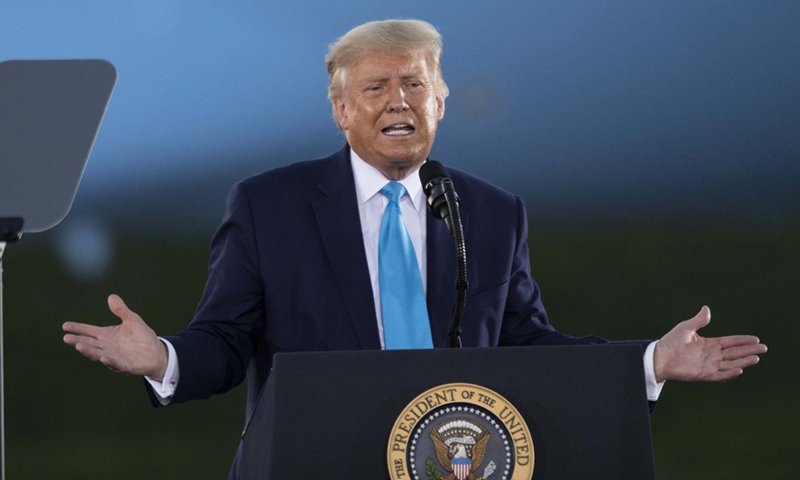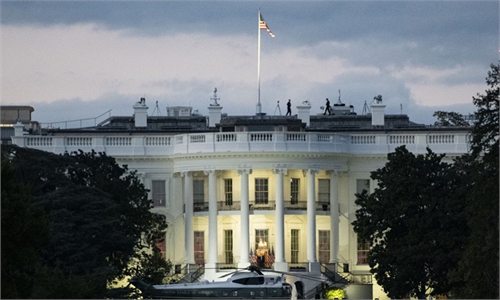
File photo taken on Sept. 3, 2020 shows U.S. President Donald Trump participating in a campaign rally in Latrobe, Pennsylvania, the United States. (Xinhua/Liu Jie)
That US President Donald Trump tested positive for COVID-19 and his subsequent treatment has highlighted COVID-19 treatments and cure rate of people aged 70 years and older, with Chinese doctors saying that although older people face higher risks of severe illness and death related to COVID-19, early intervention, timely and effective treatment, and stable personal health conditions could contribute to a speedy recovery.
Trump was hospitalized at Walter Reed National Military Medical Center after testing positive for COVID-19. According to Trump's doctors, he has been receiving a five-day course of the experimental antiviral drug Remdesivir and a large dose of an experimental monoclonal antibody treatment to "rev up" his immune system's response to the coronavirus, CNN reported.
On Saturday evening US local time, Trump tweeted a video to thank the staff at Walter Reed National Military Medical Center, saying that he feels "much better now."
The treatment of Trump, who is 74 years old and reportedly overweight, has drawn worldwide attention, raising discussions on COVID-19 treatment for people aged 70 years and older.
Wang Guangfa, a leading Chinese respiratory expert at Peking University First Hospital in Beijing, told the Global Times on Sunday that the fatality rate of COVID-19 is directly related to patients' age as Chinese statistics showed the fatality rate of patients aged 60-80 years and above was higher than those patients from younger age groups.
According to a study conducted by the Chinese Center of Disease Control and Prevention in February, among the total 44,672 confirmed COVID-19 patients, the crude mortality rate was 2.3 percent.
People aged 80 years and above recorded the highest crude mortality rate with 14.8 percent, and the crude mortality rate for males was higher than females.
Underlying diseases such as high blood pressure, cardio-cerebrovascular diseases and chronic respiratory diseases could result in a high risk of death for seniors suffering from COVID-19, Wang said.
However, the result of treatment for individual patients varies depending on factors such as early intervention, effectiveness of treatment and personal health conditions, Wang said.
According to current information, Trump has received timely anti-body treatment.
In Wuhan, the city worst-hit by the coronavirus in China, some 2,500 COVID-19 patients were aged 80 years or older as of April, with 40 percent in a critical condition. But Chinese doctors were able to save nearly 70 percent of them, an official with China's National Health Commission (NHC) said at a press conference in April.
The elderly are susceptible to COVID-19 and often difficult to treat as they can have a variety of underlying diseases, require a prolonged course of treatment and might suffer from organ damage, Jiao Yahui, deputy chief of medical administration and supervision of the NHC said.
Jiao added that the incidence of severe illness in elderly patients is about twice as high as other patients.
Although there is no evidence showing Remdesivir is effective in curing COVID-19, some evidence has revealed that it may reduce the time required in hospital, Wang said.
He said that elderly Chinese patients usually require an average hospital stay of longer than two to three weeks.
During treatment, Chinese doctors used the plasma extracted from blood of recovered COVID-19 patients for those in critical conditions to curb the infection of the virus, Wang said.


